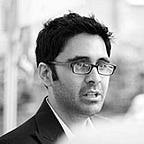A Day in the Life of Fascism
Five Lessons from History Repeating Themselves Today
I’m going to use the last 24 hours to illustrate a few simple truths about fascism. Truths which we seem to have forgotten, and so history is repeating itself in eerie and exacting echoes of the 1930s — from a stagnant economy, to a rising extremist movement, to a broken social contract, to failed institutions (whether media, political, or economic), to authoritarianism, to pundits and intellectuals and leaders who are perpetually surprised by its swiftness and fury, baffled, paralyzed, unable to ever really respond.
Fascism counts on your exceptionalism, too — not just theirs. The Supreme Court upheld the ban on a certain ethnic group. Now, I cannot think of a society in human history that has banned an ethnic group, which has not then fallen down a slippery slope — first segregation, then expropriation, and finally, cleansing and atrocity. Not one. Even today, the cycle repeats itself: see the plight of the Rohingya. And yet, American intellectuals and leaders have at every step dismissed this great lesson of history, and that is precisely why history is repeating itself in America.
So: fascism counts on your exceptionalism. Not just the tyrant’s version — “we will be pure and great again!” — but also on the version of the story that wise men tell: “ah, this will never happen to us. It will stop itself, fix itself, slow down and go away. It will never happen here!” Both are the same conceit: that one is exceptional, special, thus above the inevitabilities of history, time, destiny. But history writes laws made of steel, not clay — and to think one can mold them is hubris, whose hand writes stories of tragedy. And the greatest of those laws is the slippery slope of tribal violence, which has plagued humankind all its day long.
Fascism stuns us with fresher and larger outrages, that make yesterday’s seem irrelevant, winnowing away our decency. Now, what was truly striking was that when the ban was announced, the response was furious. And yet yesterday, when the Supreme Court upheld it, the response was less than muted — it was almost nonexistent. I didn’t see a single prominent leader, intellectual, pundit, journalist really raising a hue and cry about it. Why not? They were too busy being stunned by everything…
